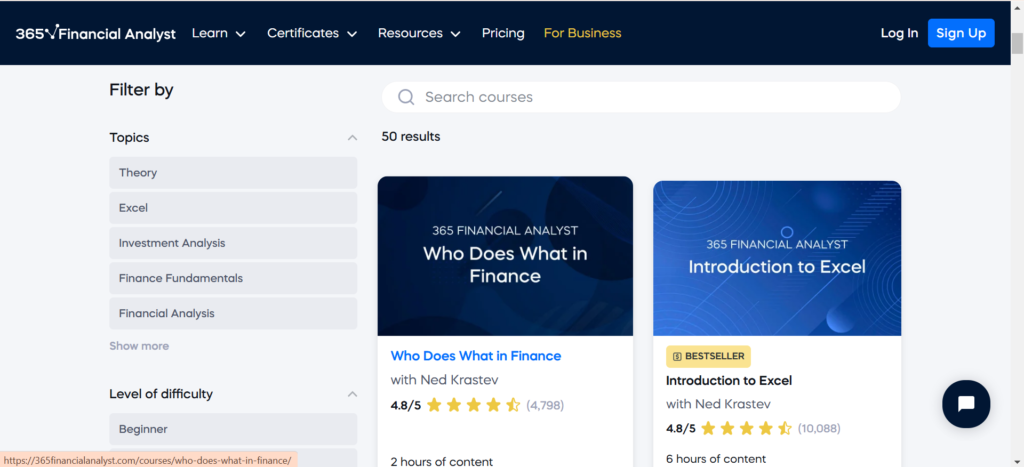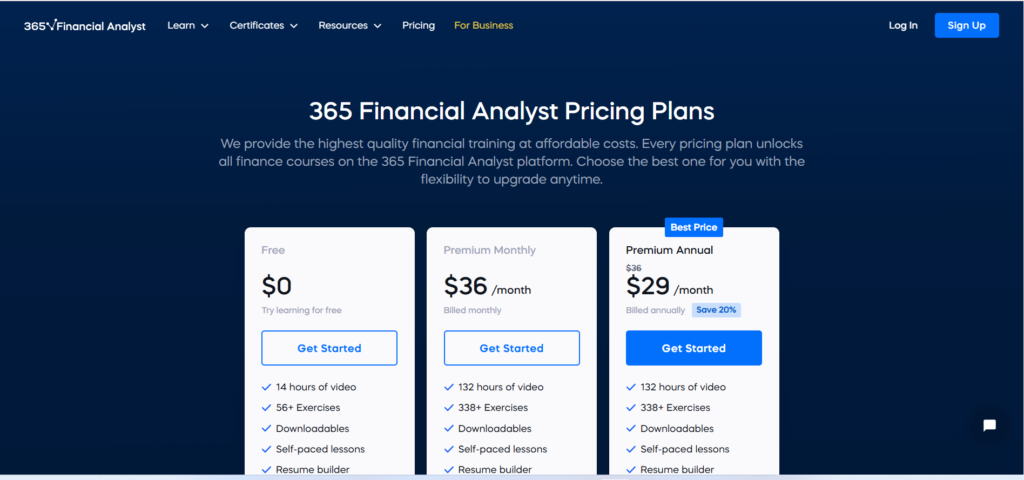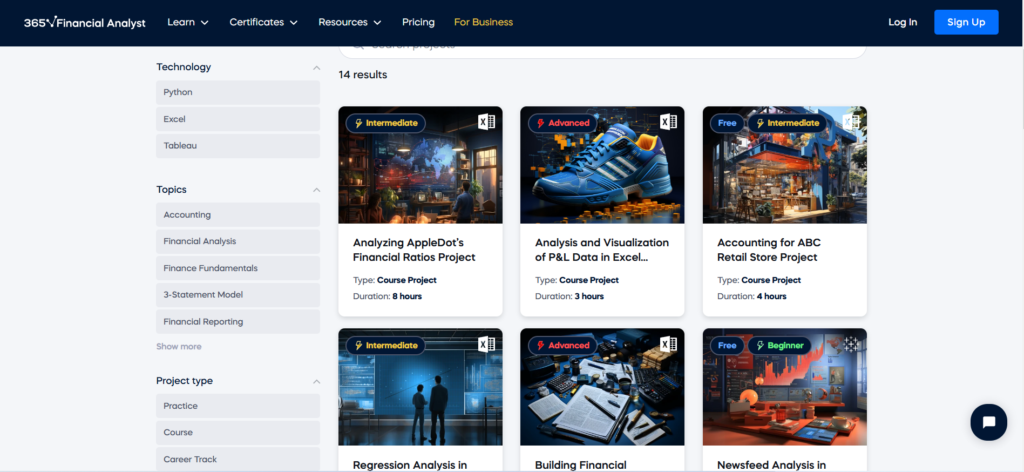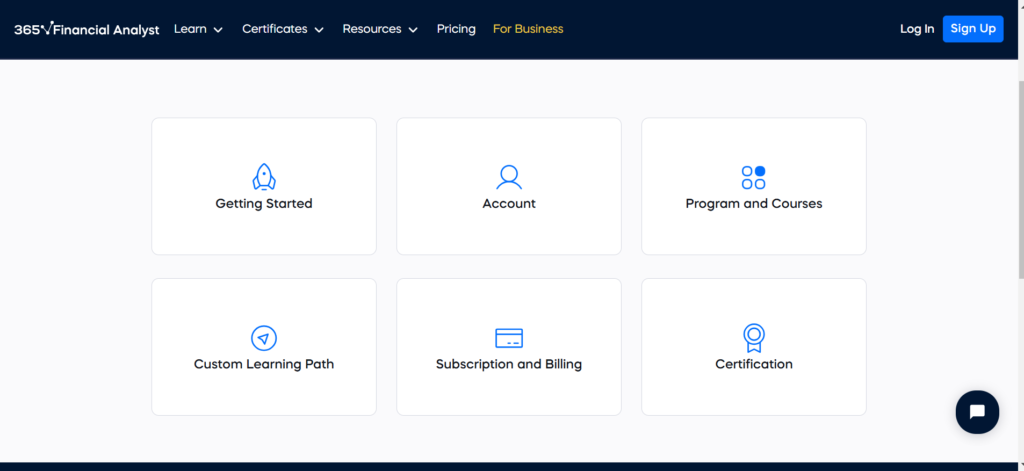To create a blog post that ranks well for “365 Financial Analyst,” we need to compare it with other financial analyst platforms or courses. Here are 12 categories we can use for the comparison:
Courses Library of 365 Financial Analyst
The 365 Financial Analyst platform offers a comprehensive library of courses designed to help learners build expertise in financial analysis, data analysis, and investment strategies. Whether you’re a beginner or an experienced professional, the platform provides structured learning paths to enhance your skills.
Course Categories
The 365 Financial Analyst course library is divided into key categories, making it easy for users to find relevant content:
Financial Analysis & Accounting – Covers fundamental concepts like financial statements, ratio analysis, and corporate finance.
Investment & Valuation – Focuses on stock valuation, risk management, and portfolio optimization.
Data Analysis & Visualization – Includes Excel, SQL, and Python for financial modeling and data-driven decision-making.
Machine Learning in Finance – Introduces AI applications in risk assessment, algorithmic trading, and financial forecasting.
Business & Strategy – Covers corporate strategy, mergers & acquisitions, and industry analysis.
Course Structure & Learning Format
Each course follows a structured format:
Video Lessons – Engaging, high-quality videos explain complex financial concepts.
Quizzes & Exams – Tests help reinforce learning and track progress.
Case Studies – Real-world financial analysis scenarios enhance practical understanding.
Downloadable Resources – Includes templates, datasets, and reference materials.
Learning Paths & Certifications
The platform offers guided Learning Paths, where courses are grouped to provide specialized expertise in areas like financial modeling, investment banking, or risk management. Upon completion, learners receive certificates, which can be added to LinkedIn profiles to enhance credibility.
Who Are These Courses For?
Beginners looking to break into finance.
Professionals aiming to upskill in financial analysis.
Analysts seeking to integrate data analytics into finance.
Final Thoughts
The 365 Financial Analyst course library is well-structured, covering essential topics for anyone looking to build a career in finance. With video lessons, quizzes, and certifications, it provides a solid foundation for financial professionals at any stage of their careers.

Financial Analyst Certificate
One of the biggest questions for anyone considering 365 Financial Analyst is whether its certification holds real value in the finance industry. Here’s a breakdown of what you can expect from their certification and how it compares to other options.
What Certification Does 365 Financial Analyst Offer?
When you complete a course on 365 Financial Analyst, you receive a certificate of completion. If you finish an entire career track, such as the Financial Analyst Career Path, you earn a program certificate, demonstrating proficiency in multiple areas of financial analysis.
Is the Certification Recognized?
While 365 Financial Analyst certificates are not accredited by universities or professional bodies like CFA Institute, they are still valuable for demonstrating skills. Many professionals use them to enhance their resumes and LinkedIn profiles, signaling expertise in financial modeling, investment analysis, and corporate finance.
How to Earn the Certification?
To obtain a 365 Financial Analyst certificate, you must:
Complete all required course materials (videos, quizzes, and exercises).
Pass the final exam with a minimum required score.
Download your certificate, which can be shared on LinkedIn or included in job applications.
Is It Worth Adding to Your Resume?
If you’re looking to build a career in finance, adding certifications from 365 Financial Analyst can be a great way to showcase your knowledge. However, for competitive finance roles, employers may still prioritize industry-recognized certifications like CFA, CPA, or FRM.
Final Thoughts
The 365 Financial Analyst certification is a great addition for those looking to validate their skills and enhance their learning experience. While it may not replace higher-level financial certifications, it’s a practical and affordable way to gain essential financial analysis knowledge.

Pricing & Subscription Plans of 365 Financial Analyst
One of the key factors when choosing an online learning platform is pricing. 365 Financial Analyst offers flexible subscription options, making it accessible for learners at different levels. Here’s a breakdown of its pricing structure:
Free Plan
365 Financial Analyst provides a free plan that includes access to selected courses and quizzes.
However, free users do not receive certificates upon course completion.
Monthly Subscription
Costs $36 per month when billed monthly.
Provides full access to all courses, exams, and certificates.
Ideal for short-term learners who want to complete specific courses quickly.
Annual Subscription
Costs $12 per month when billed annually ($144 per year).
Offers the best value for learners planning long-term financial analyst training.
Includes unlimited access to content, exams, and certificates.
Corporate & Team Plans
Custom pricing is available for businesses and teams.
Includes additional features like progress tracking and team management tools.
Which Plan Should You Choose?
If you’re exploring financial analysis and want to test the platform, start with the free plan.
If you need certification for job applications or skill development, the monthly plan is a good short-term option.
For long-term learning and cost savings, the annual subscription offers the best value.

Learning at 365 Financial Analyst
365 Financial Analyst offers a structured and engaging learning experience designed for both beginners and experienced professionals in finance. The platform provides a self-paced learning environment with high-quality video lessons, interactive quizzes, and real-world case studies.
Course Structure & Format
The courses follow a well-organized structure, starting with fundamental concepts and progressing to advanced topics like financial modeling, investment analysis, and risk management. Each course includes:
Video Lectures: Professionally recorded lessons that explain financial concepts in a clear and concise manner. (Image suggestion: Screenshot of a video lecture interface.)
Quizzes & Assignments: Short assessments after each module to reinforce learning. (Image suggestion: Example of a quiz question on the platform.)
Practical Case Studies: Real-world applications that help users understand how financial analysis works in practice.
Hands-On Learning Experience
365 Financial Analyst emphasizes practical learning by integrating Excel exercises, financial modeling projects, and data analysis tools. This approach ensures that users can apply their knowledge to real financial problems.
Flexibility & Accessibility
One of the platform’s key strengths is its flexibility. Since the courses are self-paced, learners can study anytime, anywhere. The platform is also mobile-friendly, allowing users to access lessons on the go. (Image suggestion: Screenshot of the platform’s mobile version.)
Is 365 Financial Analyst Effective for Learning?
For anyone looking to build or improve their financial analysis skills, 365 Financial Analyst offers a comprehensive and structured learning path. The combination of expert-led instruction, interactive assessments, and real-world applications makes it a solid choice for aspiring financial professionals.

Help Center – 365 Financial Analyst
The 365 Financial Analyst Help Center is designed to provide users with quick and effective solutions to common questions and issues. Whether you need assistance with course access, certification, billing, or technical problems, the Help Center has you covered.
How to Access the Help Center
The 365 Financial Analyst Help Center is available directly from the platform’s main menu. Users can browse FAQs, submit support requests, or access live chat (if available).
Common Topics Covered in the Help Center
The Help Center provides detailed answers and troubleshooting steps for:
Course Enrollment & Access – How to sign up, start a course, and track progress.
Certificates & Accreditation – How to earn and download your certificate.
Billing & Subscription – Payment methods, refunds, and plan changes.
Technical Issues – Login problems, video playback errors, and mobile access.
Learning Support – How to ask questions, interact with instructors, and use additional resources.
How to Contact Support
If the FAQs don’t answer your question, you can contact the support team via:
Email Support – Submit a ticket through the Help Center.
Live Chat (if available) – Get instant assistance for urgent issues.
Community Forum – Connect with other learners and share insights.
Tips for Getting Faster Support
To resolve issues quickly, follow these tips:
Check FAQs First – Many common problems have ready-made solutions.
Provide Detailed Information – Include your account email, error messages, and screenshots.
Use the Right Channel – For urgent issues, live chat is best; for complex problems, email works better.
Final Thoughts
The 365 Financial Analyst Help Center is a valuable resource for learners. Whether you need help with enrollment, certification, or technical issues, you can find solutions quickly and efficiently. If you can’t find what you need, the support team is ready to assist.

Pros & Cons of 365 Financial Analyst
When evaluating whether 365 Financial Analyst is the right platform for you, it’s important to weigh the benefits and drawbacks. Below, we break down the pros and cons to help you make an informed decision.
Pros of 365 Financial Analyst
✅ Comprehensive Course Library
365 Financial Analyst offers a wide range of courses covering financial analysis, Excel, accounting, and investment strategies. Whether you’re a beginner or an advanced learner, there’s something for you.
✅ Industry-Recognized Certification
Completing courses on the platform earns you a certificate of completion, which can help boost your resume and LinkedIn profile. Some certifications are well-regarded in the financial industry.
✅ Affordable Pricing & Free Courses Available
Compared to competitors like Coursera or Wall Street Prep, 365 Financial Analyst offers budget-friendly pricing with a mix of free and premium content.
✅ User-Friendly Interface & Interactive Learning
The platform has an intuitive design, making it easy to navigate. Interactive quizzes and practical exercises enhance learning.
✅ Good for Self-Paced Learning
If you prefer flexibility, 365 Financial Analyst allows you to learn at your own pace, making it ideal for working professionals and students.
Cons of 365 Financial Analyst
❌ Limited Advanced-Level Content
While great for beginners and intermediate learners, some users may find the lack of in-depth, expert-level content disappointing.
📌 Image Suggestion: A visual comparison of beginner vs. advanced topics covered.
❌ No Live Classes or Instructor Interaction
❌ Certification Recognition Varies by Employer
While the certificates are valuable, they may not carry as much weight as those from CFA Institute, CFI, or other well-known financial education providers.
❌ Lack of Job Placement Assistance
The platform does not provide direct career support, job placement, or networking opportunities, which can be a drawback for job seekers.
Final Thoughts
365 Financial Analyst is a solid choice for those looking to gain foundational financial analysis skills without breaking the bank. It’s ideal for self-paced learners and beginners but may not be the best fit for those seeking advanced content or job placement assistance.
Would you like to explore more details on any of these points?



